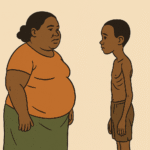Nutrition in Africa: Combating Deficiency and Malnutrition

Nutrition is the foundation of good health, yet millions of Africans face chronic hunger, micronutrient deficiencies, and malnutrition. From undernourished children in rural communities to urban families struggling with rising food prices, the problem has multiple faces. According to UNICEF, nearly 60 million children in Africa are stunted due to poor diets, while obesity is also increasing in some regions. Tackling malnutrition is essential to improving overall health, productivity, and life expectancy across the continent.
The Double Burden of Malnutrition
Africa is facing a paradox: undernutrition and overnutrition coexist. On one side, millions suffer from deficiencies in iron, vitamin A, and iodine—nutrients vital for growth and immunity. On the other, urban populations are increasingly consuming high-calorie, low-nutrient processed foods, leading to rising cases of obesity, diabetes, and hypertension.
This double burden puts a strain on healthcare systems and slows economic growth, as unhealthy populations are less productive.
Causes of Nutrient Deficiency
-
Poverty and Food Insecurity – Many families cannot afford diverse diets.
-
Climate Change – Droughts and floods disrupt food production.
-
Cultural Practices – In some areas, certain nutritious foods are under-consumed due to tradition or taboo.
-
Urbanization – Rapid city growth fuels dependence on cheap, processed foods.
Consequences of Malnutrition
-
Stunted Growth – Millions of children fail to reach their full potential.
-
Weakened Immunity – Increases vulnerability to infections and disease.
-
Reduced Learning Ability – Poor nutrition affects brain development, lowering school performance.
-
Economic Impact – Malnutrition reduces workforce productivity, costing African economies billions yearly.
Solutions and Opportunities
-
Promoting Local Superfoods – Foods like moringa, millet, baobab, and sorghum are rich in nutrients and affordable.
-
Nutrition Education – Teaching families how to prepare balanced meals from local ingredients.
-
Government Policy – Subsidizing healthy foods, fortifying staples (like salt with iodine or flour with iron), and supporting smallholder farmers.
-
School Feeding Programs – Providing nutritious meals at schools improves attendance, learning, and health outcomes.
-
Public-Private Partnerships – Collaboration between governments, NGOs, and businesses can create sustainable food systems.
Success Stories Across Africa
-
In Ethiopia, large-scale nutrition programs reduced stunting rates in children under five.
-
In Nigeria, cassava flour is being fortified with vitamin A to fight deficiencies.
-
In South Africa, school feeding schemes have boosted academic performance and reduced hunger among disadvantaged children.
Conclusion
Nutrition is not just about food—it’s about health, development, and the future of Africa. By investing in sustainable food systems, promoting local diets, and implementing strong policies, the continent can overcome malnutrition. With coordinated effort, Africa can move from a continent battling food insecurity to one thriving on the strength of healthy, nourished citizens.
Written by Fawzi Rufai, Medically Reviewed by Sesan Kareem



